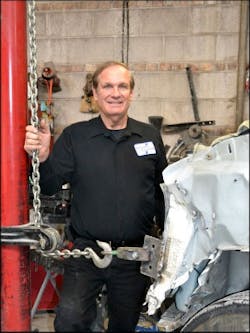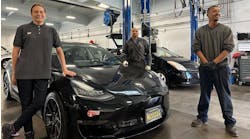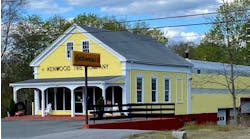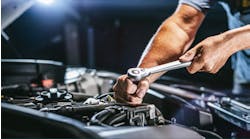Thrown to the wolves. That’s one way Chris Rahn puts it. A big struggle would be another.
Difficult, uneasy, uncomfortable—Pick a negative adjective and it’d stick just fine.
As the recent technician-turned-owner of the Waterloo, Ill., shop he and his wife, Tammy, founded in 2010, Chris had 10 years’ worth of experience to help him in the back end of the two-bay, small-town business. The three-and-a-half years’ worth of scouring for locations and developing a business plan helped both Chris and Tammy identify the specifics of their business. Both Rahns are people persons, too, able to comfortably communicate with anyone who walked in their doors.
The problem was selling; Chris simply couldn’t do it, he says.
He struggled to transform from the “neighbor-down-the-street” to someone who needed to sell an entire repair order to keep the business running.
“One of my biggest fears was how can I have a successful shop if I don’t know how to sell?” Chris says. “The place where I worked before had trained sales people. They weren’t car people, they were sales people, and they knew how to make people buy stuff. They were smooth at it. How do we compete with that?”
Chris and Tammy decided that if they were going to make it work, trying to duplicate those tactics wouldn’t work. Chris had to take every little tip he picked up watching the service advisors at his old job, every little observation, and throw it out the window. If Rahn’s Hometown Auto Repair was going to succeed, it would have to be by doing what made them different from competitors, not copying them.
The Rahns decided to focus on relationship selling.
The Backstory
For years, Chris took mental notes. He knew he wanted to open his own shop at some point, and, as he worked through a decade-long stint as a technician at a regional chain tire and service center in St. Louis, Mo., he kept track of the things he wanted to carry over into his own business—and the things he didn’t.
“There were a lot of things they did right,” he says. “Their goal was always to be as convenient as possible for the customer. They gave rides, had shuttles, had a quick lube. There were a lot of things that maybe I couldn’t do exactly, but I could take that mentality.”
“It’s about doing those extra little things that customers remember,” Tammy says. “That’s what builds loyalty.”
Chris also grew to understand the importance of systems, processes and procedures on a business.
Efficiency and productivity were key, he says, but shouldn’t come at the expense of the customer. The number-driven, hard-sell mentality he saw in the front office was something Chris never wanted repeated in his own business. He wasn’t going to push repairs on customers that weren’t 100 percent necessary.
The Rahns had a vision of a true local, neighborhood business that customers could trust, and they saved for years to try to make that happen.
By the time their 1,120-square-foot location on South Moore Street became available, the Rahns had spent nearly four years perfecting their business plan, waiting to open up shop.
The Problem
The Rahns knew they needed to start slowly with their new business. Really, they didn’t have much choice.
“The shop was basically just a cinder block building when we moved in,” Tammy says. “There was nothing there.”
The building had been occupied by a body shop previously, but new EPA regulations forced that business to close. The Rahns moved in on the cheap, and began rebuilding it. They put their $24,000 worth of savings into the purchase and rebuild, but borrowed only $7,000 total (from a loan through the county). With the help of some friends and family, the Rahns did all the work on the shop themselves, putting in an office, fixing up the bathroom, and outfitting the two bays with equipment and tools.
“I had a decent stream of customers from my old job and some side work I did over the years,” Chris says. He’d have between two and four jobs a day for the first several months, finding time to make additional shop improvements in his spare time.
While strenuous, things were relatively simple, Chris says. He had processes in place for vehicle inspections, parts ordering and vehicle repairs. And he followed them, while handling the customers the only way he knew how: with honesty and a humble, neighborhood approach.
And car count grew. The Rahns started a referral program where they would give someone 10 percent off their next job if someone they referred came in for work. Chris also joined a BNI Group–style networking organization called Monroe County Connection.
Combined with the level of service, it all added up to the shop’s appointment sheet starting to fill up. But as the workload increased, revenue remained more stagnant than the Rahns expected.
“We were growing and getting more and more business, but it wasn’t really showing [in the numbers],” Tammy says.
“We were getting customers,” Chris says, “but I just wasn’t selling the work to each of them. We’d be spending the time and effort on inspecting the vehicle and not getting much to show for it.”
In 2011, the shop came up short of reaching $200,000 in sales.
The Decision
Sure, the Rahns shop was—and is—small, but it still has quite a few advantages going for it. A lot of it has to do with location.
Waterloo is a 9,800-person town, and despite being just 30 minutes south of St. Louis, it is very much a small town with a distinct “small town feel,” Tammy says. It also happens to be the Rahn’s hometown.
“People here are proud of this town,” Tammy says. “People like buying local and using local businesses.”
“And, really, we’re one of the only locally owned shops around,” Chris adds.
And while the Rahns couldn’t provide shuttle services or posh waiting rooms like some of their big competitors, they could offer a more personal connection to each customer who walked in the door.
Their customer service was already doing that. They just needed it to translate to selling jobs.
At the time, their closing rate on work listed per estimate was just 80 percent.
“We just reached a point where we needed to figure out how to do this,” Chris says. “I knew I never wanted to be a hard-selling guy. That just wasn’t me. But, I could take the things we were good at—honesty and delivering quality work and accurate estimates—and turn that into the selling point.
“Basically, we thought about the way we wanted people to sell to us, and that’s what we were going to do.”
They developed a sales systems between the two of them. Tammy mans the front desk and answers calls and schedules appointments. Chris does the full inspections on each vehicle, labeling each item he finds as either critical, needed or recommended. He then turns the results over to Tammy, who writes an estimate, including prices. Then it’s time for Chris to sell the job.
“I simply break it down into those three categories for the customer, really try to educate them on what the issues are and how important they are,” he says. “I’ll give them my recommendation, tell them what I would do if it were my car or Tammy’s car, and then let them have options.
“The goal is to not push anything on them, to not be that pushy salesman—and hope that my honesty builds trust and builds that relationship. … It’s relationship selling.”
The Aftermath
Sales topped $240,000 in 2012, they approached $300,000 in 2013, and the shop’s closing rate improved to 95 percent.
And that’s all organic growth. No expansions have been done to the shop, although the Rahns were able to hire a part-time technician, a student at a local tech school who gives Chris a hand in the back of the shop.
With costs low—rent and expenses are “very cheap” in Waterloo, Tammy says—the shop’s margins are well above the industry benchmarks of 60 percent gross and 20 percent net.
And, as owners, the Rahns say they’re now hitting their stride. Work flow is efficient, and Tammy, who’d spent seven years in human resources before quitting her job to help in the shop full-time during its second year, is now feeling comfortable in the industry.
She’s definitely comfortable with where the Rahns’ business is headed.
“We have a family—two small kids—and one of the things I really admire about Chris is that he works really hard at what he does, but our family still comes first,” she says. “He doesn’t waste every minute in the shop. He works 45–55 hours [per week]. We’re not open weekends, we closed for a week around Christmas. The business isn’t running us.”
The Takeaway
Play to your strengths—that’s the biggest lesson he’s learned, Chris says.
“We’ve found our niche,” Chris says. “Other shops in the area will give that hard sell. Here, it’s relaxed, nonconfrontational, and our customers seem to appreciate that.”
The focus is on the long term, Tammy says. They’re not worried about squeezing nickels and dimes out of each job. Instead, they’re trying to create lifelong customers.
“Keeping that customer coming back again and again, and having them refer us to their family and friends is far more valuable than making sure we got that air filter this time around,” Chris says. “This is our home here. We want our customers to be treated right.”



